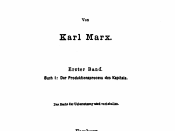Capital or "Das Kapital", in it's original German form, continues to be one of the most important contributions to economics in history. Although Karl Marx wrote it in 1867, it is still just as relevant in our present time as it was 185 years ago. Too often Marx's writings are quickly discarded as simple communist propaganda and ignored by today's mainstream intellectual society. Capital is nothing of the sort. It is in fact an in depth description of the capitalist system and the way it works. Marx thoroughly explains the basic fundamentals of capitalism and uses these ideas to critique it. He points out the system's faults and explains why they exist. Karl Marx is one of the most controversial historical figures ever but whether you are "for" or "against" his radical ideas, this book can be of significant value to you.
Capital begins with the basics, the foundation that the capitalist system is built upon.
In Part I Marx describes commodities, exchange, and the circulation of money and commodities. A commodity is essentially something that is bought or sold. This includes everything from corn to a worker's labor, which is sold to his employer in exchange for wages. It is explained that every commodity has an equal value, which can be matched with any other commodity. For example, 20 yards of linen is equal to a single coat or 2 tons of iron is equal to 4 ounces of gold. The value of a commodity is determined by three factors; use-value, exchange value, and labor power. Labor power is the skill and time a worker uses to produce a commodity. Labor manifests itself in whatever is produced. The use value is simply what the commodity is worth to the people it is being sold to. For example,


